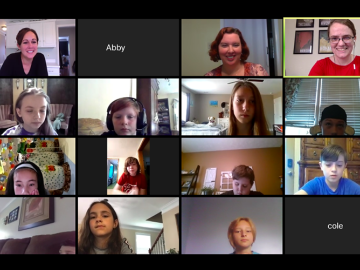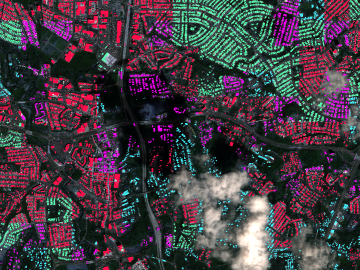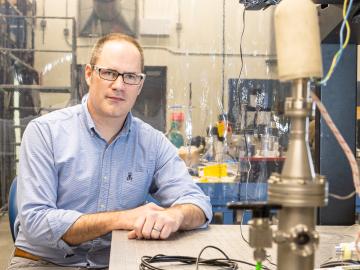
Filter News
Area of Research
- (-) Nuclear Science and Technology (11)
- (-) Supercomputing (71)
- Advanced Manufacturing (3)
- Biological Systems (2)
- Biology and Environment (100)
- Biology and Soft Matter (1)
- Computational Biology (1)
- Computational Engineering (2)
- Computer Science (7)
- Electricity and Smart Grid (1)
- Energy Science (77)
- Functional Materials for Energy (1)
- Fusion and Fission (4)
- Isotope Development and Production (1)
- Isotopes (27)
- Materials (56)
- Materials for Computing (9)
- Mathematics (1)
- National Security (39)
- Neutron Science (26)
- Quantum information Science (4)
News Topics
- (-) Big Data (22)
- (-) Bioenergy (9)
- (-) Coronavirus (14)
- (-) Cybersecurity (9)
- (-) Isotopes (7)
- (-) Machine Learning (15)
- (-) Microscopy (7)
- (-) Space Exploration (8)
- 3-D Printing/Advanced Manufacturing (8)
- Advanced Reactors (12)
- Artificial Intelligence (37)
- Biology (11)
- Biomedical (19)
- Biotechnology (2)
- Buildings (4)
- Chemical Sciences (5)
- Computer Science (97)
- Critical Materials (3)
- Energy Storage (8)
- Environment (23)
- Exascale Computing (26)
- Frontier (32)
- Fusion (9)
- Grid (5)
- High-Performance Computing (43)
- Materials (15)
- Materials Science (19)
- Mathematics (2)
- Molten Salt (5)
- Nanotechnology (11)
- National Security (8)
- Neutron Science (17)
- Nuclear Energy (39)
- Partnerships (1)
- Physics (10)
- Polymers (2)
- Quantum Computing (20)
- Quantum Science (25)
- Security (6)
- Simulation (16)
- Software (1)
- Summit (43)
- Transportation (6)
Media Contacts

With Tennessee schools online for the rest of the school year, researchers at ORNL are making remote learning more engaging by “Zooming” into virtual classrooms to tell students about their science and their work at a national laboratory.

In the race to identify solutions to the COVID-19 pandemic, researchers at the Department of Energy’s Oak Ridge National Laboratory are joining the fight by applying expertise in computational science, advanced manufacturing, data science and neutron science.

We have a data problem. Humanity is now generating more data than it can handle; more sensors, smartphones, and devices of all types are coming online every day and contributing to the ever-growing global dataset.

A novel approach developed by scientists at ORNL can scan massive datasets of large-scale satellite images to more accurately map infrastructure – such as buildings and roads – in hours versus days.

Researchers across the scientific spectrum crave data, as it is essential to understanding the natural world and, by extension, accelerating scientific progress.

For nearly three decades, scientists and engineers across the globe have worked on the Square Kilometre Array (SKA), a project focused on designing and building the world’s largest radio telescope. Although the SKA will collect enormous amounts of precise astronomical data in record time, scientific breakthroughs will only be possible with systems able to efficiently process that data.

If humankind reaches Mars this century, an Oak Ridge National Laboratory-developed experiment testing advanced materials for spacecraft may play a key role.

Researchers at the Department of Energy’s Oak Ridge National Laboratory have received five 2019 R&D 100 Awards, increasing the lab’s total to 221 since the award’s inception in 1963.

The type of vehicle that will carry people to the Red Planet is shaping up to be “like a two-story house you’re trying to land on another planet.

In collaboration with the Department of Veterans Affairs, a team at Oak Ridge National Laboratory has expanded a VA-developed predictive computing model to identify veterans at risk of suicide and sped it up to run 300 times faster, a gain that could profoundly affect the VA’s ability to reach susceptible veterans quickly.


